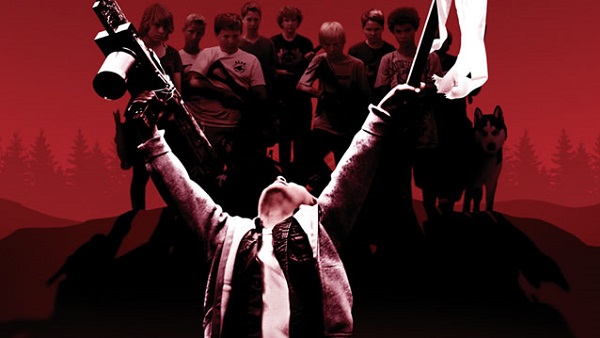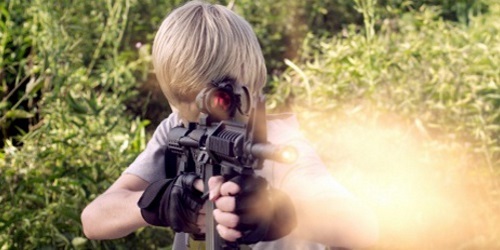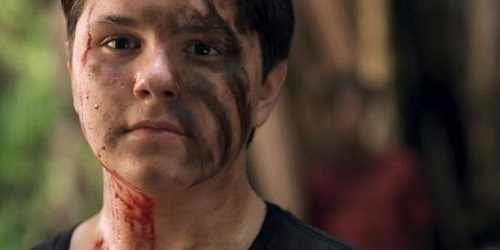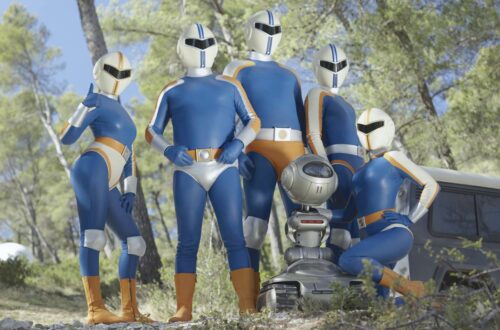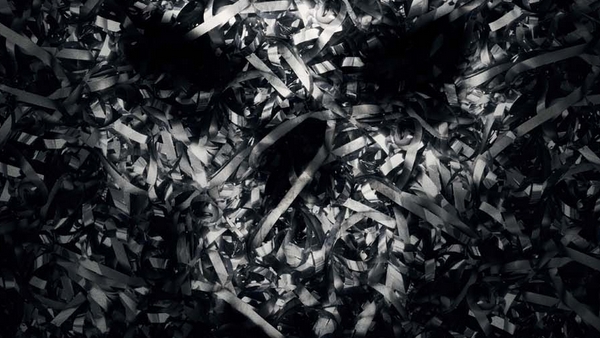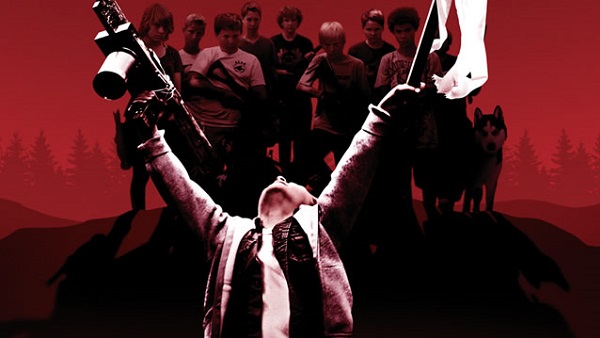
Do you remember being twelve? Jason Lapeyre and Robert Wilson do, and they want you to share in their reminiscences with I Declare War (read Marc’s review here and mine here), a cinematic reverie that’s all about the clouds hovering just above the bright spots of childhood. It’s also a film where twelve year olds run around with automatic weapons and rocket launchers, but don’t worry; that’s just their imaginations talking. Sticks and balloons become assault rifles and grenades in their variation of capture the flag, where death can be conquered after counting to ten steamboats (unless you get pasted with one of those grenade first). Turns out that the real harms they risk exist on an emotional level.
I got the chance to talk with Jason and Robert , who were gracious enough to spare some of their time for me, over the phone about the film earlier this week; they were a lot of fun to talk to, and had a great deal of insight to offer on what it’s like to be a modern kid, the particulars of working with a young cast, and the myth of preteen nostalgia. Read on to see what they had to say about their joint effort in directing the film together.
—————————————————————————————————————————————————
Go, See, Talk: I understand that with I Declare War, you wanted to tell an honest story about what it’s like to be twelve years old, but there’s something almost nostalgic about the idea of kids playing capture the flag instead of mucking around on their smart phones. Do you feel like these are modern kids being represented here?
Jason Lapeyre: Well, for me childhood took place back in 1986, so I Declare War definitely is representative of my own childhood. But yeah, even though there’s a bit of nostalgia there, I think these are absolutely modern kids…even though kids might be on their smart phones instead of out in the woods running around, to some extent, I think the emotions of being twelve are still going on, just maybe in a different form.
Robert Wilson: Yes, it was sort of feeling nostalgic, but that was one of the things about reading the script, it was sort of like, ‘Holy sh*t, that’s exactly what it was like when I was a kid.” We really wanted it to be timeless, which meant we really had to include a cell phone, or the notion of the cell phone, or that things had changed, but we wanted it to feel as timeless because of those kids’ emotions.
JL: Yeah, and a big indication of that was that when the cast read the script – and at the time the cast were all between the ages of thirteen and fifteen- they completely got it. They were like, “Yep, this is what it’s like, this is what we do.” So even though they are on smart phones a lot of the time, I think there’s still a fair amount of running around in the woods and on the streets.
RW: Yeah, I mean, if we had Call of Duty when we were twelve, we would be playing it, right? *laughs*
GST: That last bit is reassuring to hear for me. I was born in ’84, so I was running around in the woods as a kid, too, so this reminded me a bit of my own childhood. I was really curious to get your take on that.
RW: It’s weird, because, I mean, we both lived through when Dungeons & Dragons was going to rot our brains, like a weird crack cult.
JL: Every generation is convinced that their children are doomed, right? So it’s totally natural for us to feel this way.
GST: Absolutely. So, one thing I always tend to ask directors who work with child or teenage casts – how easy did you find it to work with them and direct them, and how did they handle the flow of production overall?
RW: Oh, it was great to work with them, the best experience you’re going to have, and it was unique in that we’re talking about an entire cast that way. That allows you to leave the adult sh*t right out of it, and everybody gets to go back to being twelve. There’s a stress that disappears, they can turn it off for the camera, and they do horrible things in front of the camera and then go back to normal afterwards. It’s not really a place where our actors were spending a week in character to get ready for each scene. It was fun.
JL: It really helped that we gave them a super fun job to do, you know, running around in the woods with automatic weapons. They definitely came to play. (laughs) You know, they were all professional actors, so they came to do the job, and we came to do the job, and we never patronized them. We never talked down to them. We worked with them as professionals, and they delivered as professionals, so it was a total collaboration.
RW: Yeah, whether you’re working with them or just hanging out with them, there’s a thing that happens where you don’t accidentally fall into your “big person” voice, and they respond to it. They are equal in so many ways. They think in different ways, too, but you can have a relationship with these people and they expect that, I think, first and foremost.
GST: That kind of leads me to my next question: where did you find these kids? You’re talking about their gifts and how you were looking for professionals, I thought they were all extremely good, particularly Gage Munroe and Michael Friend.
RW: We had this dream of, you know, touring drama classes and finding a bunch of unknowns that really blew us out of the water. But our casting told us to shut up and relax, and they brought them in, and they were really good actors. And some of them had been on film sets, and some of them had two series under their belts. It was a much easier process than we thought, and we hadn’t expected it to go that well. Michael Friend walked in on the first audition, read for Skinner, and we were terrified of him. We were like, ‘That’s the guy.”
GST: What I thought was really amazing about his performance is that in the end, I think the natural reaction is for us to empathize with him, which is an absolutely enormous thing considering the awful stuff he does throughout the rest of the picture.
JL: Yeah, thank you, I mean, that’s example of where we were aware of what was happening when we were on the floor watching his performance. There were really awesome moments of just turning to each other after the take and going, “Holy sh*t, he’s killing it!” Our cinematographer started calling him Young De Niro during the shoot because he was so capable of that intensity, but what was so shocking about it is that, you know, he really could turn it on and turn it off. He’s that good an actor. His name is Michael Friend, and it’s apropos. He’s the sweetest, kindest, gentlest kid you could imagine.
RW: Skinner was a total creation, you know. Part of that casting process and fear is that you’re going to have to sort of typecast these kids – you’re clearly not going to find a psychopath and put him in, but you’re worried you’re looking for that, but Michael Friend and Michael Skinner could not be further apart.
GST: Oh, I’m sure. And that’s interesting because everyone felt very natural in their roles, and all the roles are completely different – you’ve got the loquacious, chatty guy in Frost, you’ve got the silent hunter, you’ve got Joker, the angry soldier. So everyone felt natural in these roles, and these roles all feel like dedicated war movie roles. You see these types in other war movies.
JL: Thanks! That was totally what we were going for.
GST: One thing that went through my mind while I was watching, if the average person sees the ad for this on the TV, you know, what they might think of the film. Were you or are you still worried about how sensitive parents might react to what I Declare War appears to be about on the surface?
RW: Well, from the sort of producer capacity…yes and no. We didn’t start thinking about that until after the film was done because we’re dumb. We really never thought about it. We moved really fast, and the thing about it was, you know your movie is eventually going to play on television, and the script was so rich in that sense that if I was flipping through the channels and I caught three frames of it, I would still watch. We didn’t think about parents in that equation, we just all ran forward, and suddenly we were looking at this thing that’s…it’s for twelve year olds in the sense that it’s non-patronizing and sort of describes their world, and the reaction they have to watching the movie and watching themselves, or people like themselves, on screen is amazing.
But you have to respect that some parents don’t want their kids to see forty seven F-bombs fired off by twelve year olds in the woods with machine guns on top of it, so…
JL: To this date, the only outraged reactions we’ve had are from people who haven’t actually seen the movie. They’ve just seen the trailer and then jumped on a message board and got all irate. And anyone who’s seen the movie recognizes that it’s not a movie about guns, it’s a movie about childhood.
GST: Right. The saying is that sticks and stones can break your bones, but words can never hurt you, but this seems to be all about how the real trauma these kids experience – and maybe “trauma” is experiencing a little bit – and the only real wounds they feel are the ones they speak to each other. It’s not so much about kids getting maimed as it is about kids hurting each others’ feelings and hurting each other emotionally.
JL: Yeah, trauma is overstating it a bit, but at the same time, I remember after I’d written the film, I was reading an interview with the filmmaker Michael Cuesta, who did the movie Twelve and Holding, and he also created Homeland, the series, and he’s one of the executive producers, and he had this great quote where he said, “Everyone’s childhood is like their own personal Vietnam.” It’s like this thing that sort of traumatizes you and informs the rest of your childhood, and you keep it buried deep down in your psyche, and I think that’s part of the reason we wanted to make the movie, because we wanted to sort of remind everybody that the golden days? The golden ages that you remember? Kind of bullsh*t! *laughs*
GST: So, I wouldn’t call this just a war movie – you have movies like Patton mentioned here, and I think it’s part of that genre, but I think it’s refreshing that you refuse to ape or crib from any movies apart from naming Patton, or having a character named Frost, which made me think of Aliens immediately. What apart from your experiences being twelve informed the shape of the film?
RW: Being twelve. (laughs) I mean, it’s different for us, I think, or at least for me, than it is for others. For me it’s seeing a movie on VHS for the first time that you weren’t supposed to be seeing. That sort of stuff is where the imagery and intensity came from, because it was exciting and dramatic and you went home, and it was over, and the next day you get to say you’re different. So capturing that was important.
—————————————————————————————————————————————————
Thanks to Jason and Robert for their time and for Allied and Drafthouse for arranging the interview. I Declare War is in theaters and on VOD now.
